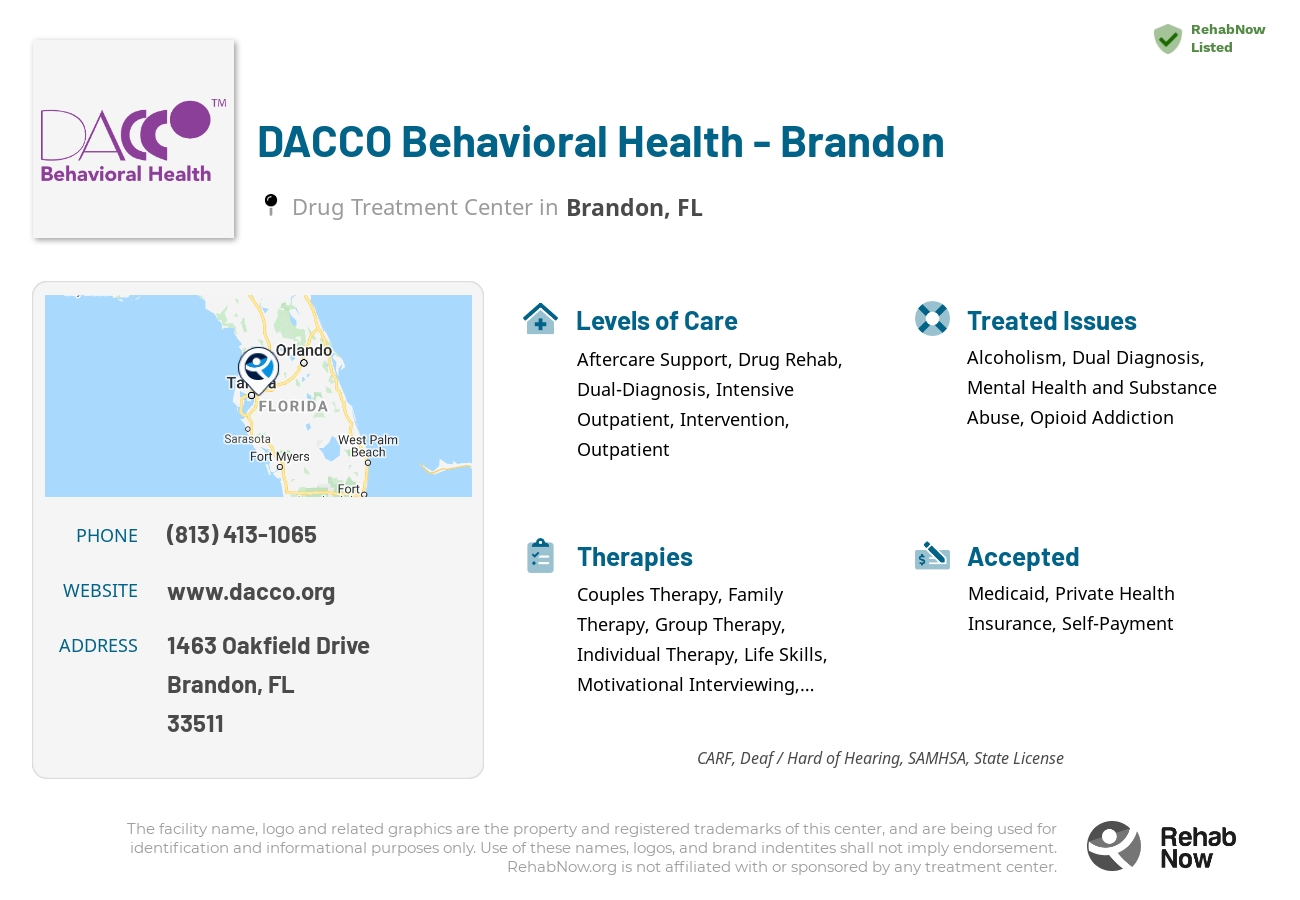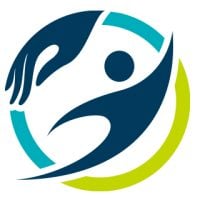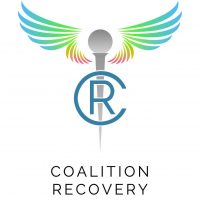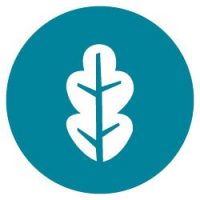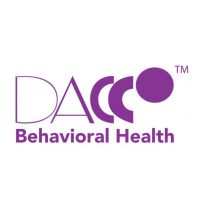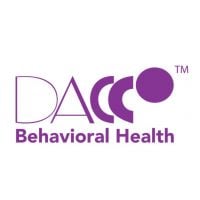DACCO Behavioral Health - Brandon
Drug Rehab Center in Brandon, Florida
Cove Behavioral Health - Brandon is a reputable treatment facility in Brandon, Florida, offering comprehensive treatment for alcoholism, dual diagnosis, opioid addiction, and drug addiction, with various levels of care and aftercare support available.
About DACCO Behavioral Health - Brandon in Florida
DACCO Behavioral Health, situated in Tampa, Florida, excels in treating individuals battling with co-occurring mental health disorders and substance abuse. Known for its comprehensive approach and gender-specific residential treatments, DACCO stands out for welcoming pregnant and post-natal mothers, emphasizing community-based recovery, and combining traditional clinical therapies with vocational rehabilitation to foster holistic healing.
- Gender-specific Residential Programs: DACCO accommodates women in small dorms and men in larger dorm areas, promoting gender-focused healing.
- Comprehensive Care Approach: Combines medication-assisted treatment with mental health counseling for a well-rounded recovery.
- Inclusive Services: Open to men, women—including pregnant and post-natal mothers—and youth, with a commitment to life-long recovery.
DACCO is distinguished by its accreditations from leading health organizations and offers a range of services from residential to outpatient treatments. Their focus on treating addiction with medication-assisted programs and psychological counseling ensures a higher chance for long-term success, making them a trusted resource in the Tampa area.
The center caters to individuals struggling with substance abuse, opioid addiction, providing a variety of treatment methods like individual therapy, group counseling, and comprehensive medical and psychiatric support. Their programs emphasize the development of recovery skills, education, and family involvement for sustainable sobriety.
Genders
Ages
Modality
Additional
Accreditations
State License
SAMHSA

LegitScript

CARF
The Commission on Accreditation of Rehabilitation Facilities (CARF) is a non-profit organization that specifically accredits rehab organizations. Founded in 1966, CARF's, mission is to help service providers like rehab facilities maintain high standards of care.
Conditions and Issues Treated
Opioid addiction has become a significant health problem in the United States. In 2015, there were 91 opioid overdose-related deaths per day, with a substantial increase in mortality rate in 2014.
When opioid addiction has reached a point where a person’s life becomes unmanageable, treatment options are available to help them get sober. Treatment that includes medical care with medications and counseling can help a user transition into sobriety.
When someone in struggles with both addiction and mental or emotional illness, this is considered a dual diagnosis. Dual diagnosis treatment can include therapy for these issues to happen simultaneously, which will allow either of them to be treated effectively.
Sometimes people who have suffered from addiction disorder also suffer from co-occurring disorders such as depression, anxiety, bipolar disorder, etc., making them “dual diagnoses.” Dual diagnoses require specialized treatment programs where drug and alcohol addiction are addressed along with psychiatric illnesses. Some rehabilitation facilities provide patients suffering from cooccurrences a program with highly integrated services and a clean environment with few distractions to help them succeed.
Levels of Care Offered
This center offers a variety of custom treatment tailored to individual recovery. Currently available are Aftercare Support, Drug Rehab, Dual-Diagnosis, Intensive Outpatient, Intervention, Outpatient, with additional therapies available as listed below.
The Intensive Outpatient Program offered by DACCO Behavioral Health - Brandon is designed for those who need intensive care but would rather get it in the comfort of their own home. The treatment programs vary in duration and intensity and can be tailored to suit the patient’s needs. The program includes regular visits to the facility, though the overnight stay is not needed. IOP is suitable for patients who have been treated in residential treatment programs and are in the transition phase. It helps the patient live at home and discharge some work or school responsibilities even while undergoing treatment. The patients gradually get back to their routine life with the support of a friend or family member.
Outpatient treatment is often used for drug addicts in drug rehab. Outpatient treatment consists of counseling and therapy sessions. This form of treatment is also called ‘day-treatment’. The outpatient treatment process begins with the addict’s initial detox period, lasting about ten days.
Outpatient treatment is used for those who are at moderate risk for ‘slipping back’ into the addiction, for those who:
- Are not currently experiencing any side effects from withdrawal and can handle social pressure
- Can handle stressors that might trigger relapse
- Have a stable living environment or have moved out of their previous environment, which was not conducive to being sober
- Have a support system that allows them to go to a facility a few times a week while still keeping their current responsibilities
- Have no legal obligations, being either on parole or probation, that require them to seek treatment at a mandatory facility
- Are not currently experiencing any side effects from withdrawal and can handle social pressure
- Have a stable living environment or have moved out of their previous environment, which was not conducive to being sober
Intervention Programs can be beneficial for those who are not prepared to engage in a recovery program. The individual’s friends and family will call and set up an intervention in or near Brandon, and at which a specialist will come and lead the discussion. Interventions help family members motivate those affected to seek external support.
People involved in substance abuse usually deny the harmful effects of their changed behavior. They believe they can overcome addiction alone. This, however, can be difficult without external help. Intervention services deploy professionals to help organize meetings between individuals and family members. Family members converse openly with the affected individual and express concern for them. They explain different treatment options and persuade the individual to act immediately.
Completing a drug or alcohol rehab program is only the first step. Then comes aftercare support. These services include sober living accommodations, career counseling, and AA/NA programs for those struggling with sobriety or who want help maintaining it after initial rehab at an addiction facility.
They can last up to a year or more depending on what’s needed most urgently after the earlier stages are completed.
Therapies & Programs
Because no single treatment is effective for all addicts, the goal of treatment and therapy should be to figure out what works best for each individual. Tolerance and withdrawal levels differ from person to person, affecting the treatment intensity required. Addiction treatment should aim to help addicts develop healthy coping mechanisms for dealing with their addiction and its underlying causes.
Couples therapy works with clients and significant others in a professional capacity to improve relationship dynamics. This can be helpful for addicts who are trying to marry the idea of recovery into their work, family, social lives – any aspect that has to do with relationships. Through counseling sessions, addicts will have an opportunity to talk about their addiction with professional partners.
Family therapy is beneficial for people who are in addiction treatment services because it offers addicts the opportunity to work with their family members to better understand what led them to make choices that contributed to their addiction.
This type of therapy helps family members reach a deeper understanding of how they can best support their loved one during recovery. It also helps the addict better understand their own motivations and triggers that led them to turn to substance abuse.
Family therapy can help addicts in the following ways:
- Assists family members in processing difficult feelings so they don’t blame or resent recovering addicts
- Assists family members in understanding how addiction has impacted the addict and everyone who is involved with them
- Allows the addict to take responsibility for their actions, while encouraging improved communication skills
- Helps family members understand how to best support an individual in recovery so addicts don’t relapse again.
Group therapy can help build a stronger support system and give addicts in Brandon, FL insight into their addiction that they gain through shared conversations. Group therapy occurs in a controlled group environment, exclusive of one on one meetings. This makes it safer for patients to feel comfortable sharing the struggles they’re going through and gaining perspective.
Trauma therapy is beneficial for people who are recovering from drug addiction because it helps them heal from past traumas that may have caused them to turn to harmful substances or led them to experience negative emotions that contributed to their destructive behaviors.
This type of treatment works by processing difficult experiences so individuals can learn how to process these events without having to turn to substances for coping.
Trauma therapy can help addicts in the following ways:
- Helps individuals understand their experiences and emotional responses to difficult events, including why they turned to drugs or alcohol
- Provides them with comfort and support while working through difficult emotions related to these traumatic experiences
- Offers an opportunity for addicts to have a voice and be heard, which can improve their self-esteem
- Can help them develop coping skills so they can better respond to triggers instead of turning to substance abuse.
Cognitive-behavioral therapy is a technique that is used to help people with addiction. Specifically, it is a way of identifying thoughts and behaviors that cause the addiction. It is typically used in an individual counseling session.
The content explains cognitive behavioral therapy and how it works to address some behaviors that may be leading to unintended consequences in their life, as well as its benefits for those seeking sobriety.
It works by helping people to talk through their issues and addressing the thoughts that cause said behaviors. It is an excellent way of learning about oneself and one’s perception of the world.
Life Skills Services assist addicts in their recovery by teaching them healthy coping mechanisms that will aid them in becoming sober, focussing on helping people enter into, and maintaining long-term sobriety. Drug Treatment Centers provide Life Skills Services at varying levels of intensity, specific to the needs and requirements of each patient.
The benefits of Life Skills Services offered at DACCO Behavioral Health - Brandon:
- Restores hope and empowerment — Helps addicts believe that recovery is possible and instills a new confidence in their ability to achieve a positive, drug-free future
- Enhances family involvement — Encourages families to get involved in the recovery process and supports their understanding and encouragement of healthy behavior.
- Increases patient’s compliance — Helps patients take responsibility for and ownership of their recovery and encourages continued progress
- Reduces relapse rates — Encourages long-term abstinence and emphasizes the importance of establishing sober support systems.
Payment Options Accepted
For specific insurance or payment methods please contact us.
Is your insurance accepted?
Ask an expert, call (888) 674-0062
Cove Behavioral Health Associated Centers
Discover treatment facilities under the same provider.
- DACCO - Women's Residential Treatment Program in Tampa, FL
- DACCO - MAT Program in Tampa, FL
- DACCO Behavioral Health - Tampa in Tampa, FL
- DACCO - Adolescent Outpatient in Tampa, FL
- DACCO - Tampa Outpatient in Tampa, FL
Learn More About Cove Behavioral Health Centers
Additional Details
Specifics, location, and helpful extra information.
Brandon, Florida 33511 Phone Number(813) 413-1065 Meta DetailsUpdated April 15, 2024
Staff Verified
Is DACCO Behavioral Health – Brandon a LegitScript Verified Treatment Facility?
According to our most recent records, we have found this center to be LegitScript verified.
DACCO Behavioral Health - Brandon Patient Reviews
There are no reviews yet. Be the first one to write one.
Brandon, Florida Addiction Information
Florida is one of the nation's epicenters for substance abuse and drug-related overdoses. In 2014, around 410,000 Florida residents were addicted to drugs and alcohol. Over the last 10 years, 12% of all deaths in the state were attributed to substance abuse. Treatment admissions for alcohol reached 24,329 patients in 2016, and 2.5% of Florida high school students admitted to using crack cocaine.
Drug addiction also has a big impact on the community in Brandon. The Substance Abuse and Mental Health Services Administration (SAMHSA) reports that there are around 2,800 people who struggle with drug addiction in Brandon, FL. Between 2010 and 2014, the number of overdose deaths increased by 36%. There are several 12-step programs and support groups available in the area.
Treatment in Nearby Cities
- Jupiter, FL (152.3 mi.)
- Davie, FL (180.2 mi.)
- Yulee, FL (191.4 mi.)
- Avon Park, FL (54.1 mi.)
- Mulberry, FL (20.4 mi.)
Centers near DACCO Behavioral Health - Brandon
The facility name, logo and brand are the property and registered trademarks of DACCO Behavioral Health - Brandon, and are being used for identification and informational purposes only. Use of these names, logos and brands shall not imply endorsement. RehabNow.org is not affiliated with or sponsored by DACCO Behavioral Health - Brandon.






